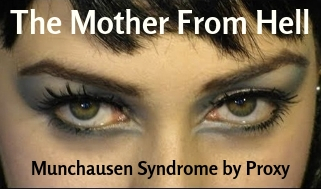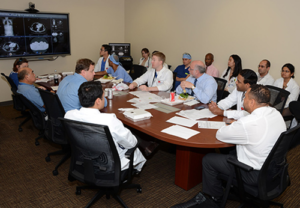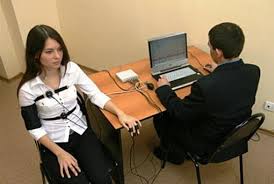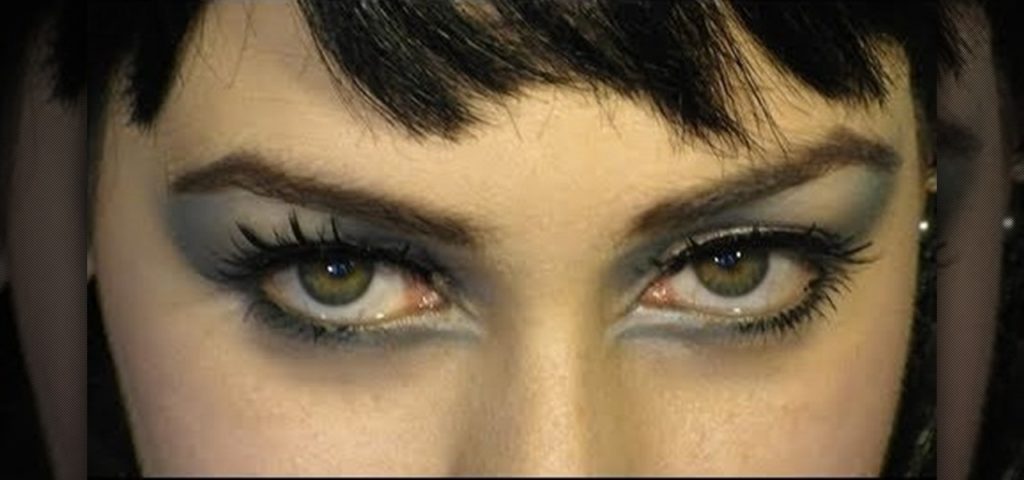 If I’d mention “Munchausen Syndrome by Proxy”, you’d likely have no idea what I was talking about. That’s understandable—I certainly didn’t when I heard it, and I’m not making this up. Munchausen Syndrome by Proxy, or MSbP, is a rare and real form of child abuse where a caregiver intentionally inflicts harm on a helpless dependent in order to gain perverted attention towards themselves. It’s a grievous crime, and sometimes MSbP turns deadly. No, I’d never heard of Munchausen Syndrome by Proxy. Not until I investigated the Mother From Hell.
If I’d mention “Munchausen Syndrome by Proxy”, you’d likely have no idea what I was talking about. That’s understandable—I certainly didn’t when I heard it, and I’m not making this up. Munchausen Syndrome by Proxy, or MSbP, is a rare and real form of child abuse where a caregiver intentionally inflicts harm on a helpless dependent in order to gain perverted attention towards themselves. It’s a grievous crime, and sometimes MSbP turns deadly. No, I’d never heard of Munchausen Syndrome by Proxy. Not until I investigated the Mother From Hell.
It was 1993 when I met the Mother From Hell—twenty years before Munchausen Syndrome by Proxy was officially designated as a serious psychiatric affliction in the American Psychiatric Association’s Diagnostic and Statistical Manual of Mental Disorders Edition 5 (DSM-5). Technically, MSbP is categorized as Factitious Disorder Imposed on Another (FDIA) which is a recognized form of medical child abuse. You’ll also hear this crazy condition called Factitious Disorder by Proxy (FDbP) and Malingering Stimulation of Disease (MSoD). No matter what term, premeditating to put one’s own child in medical peril is a sick, sadistic and heinous crime.
 Before getting into details on what Munchausen Syndrome by Proxy involves, who the stereotypical offenders are and what the medico-legal ramifications are, let me tell you how this investigation went from confusingly bad to uncontrollably worse. It’s a classic case of how a poorly-understood subject gets manipulated by the “system” and fails to protect those unable to protect themselves—especially from monsters like the Mother From Hell.
Before getting into details on what Munchausen Syndrome by Proxy involves, who the stereotypical offenders are and what the medico-legal ramifications are, let me tell you how this investigation went from confusingly bad to uncontrollably worse. It’s a classic case of how a poorly-understood subject gets manipulated by the “system” and fails to protect those unable to protect themselves—especially from monsters like the Mother From Hell.
Our Serious Crimes Section got a call from the British Columbia Childrens Hospital in Vancouver, Canada reporting a suspected case of child abuse involving Liza Nellis and her two-year-old daughter, Mariana. (Names changed to prevent me from getting sued over this case—again.) Allegedly, BC Childrens Hospital medical staff caught Liza Nellis in the act of intentionally choking little Mariana to unconsciousness.
I’m the poor bastard who got the police file.
Obviously, I’d never heard of Munchausen Syndrome by Proxy, let alone how to pronounce it. Neither had any of my detective colleagues. Nor was anyone in the prosecutors’ office and in the regular medical community familiar with this devious derangement. It was only one young pediatrician at Childrens Hospital who’d recently attended a child abuse seminar where this extremely rare psychiatric and criminal disorder came up.
The first part of any criminal investigation always involves establishing the basic case facts. Liza Nellis had a continuous history of medical complaints involving her two adopted children. One was Marianna, a toddler. The other was her older brother, four-year-old Michael. Both children were adopted from Honduras as part of a Christian Baptist placement program. Kerry Nellis, the adoptive father and Liza’s legally married husband, was a commercial fisherman and absent for long periods. For the most part, Liza Nellis was raising the two children on her own.
 Criminal suspicion of child abuse within the Nellis family simmered slowly. For approximately one year, a pattern emerged where Liza Nellis reported apnea (breathing interruption events) happening with Mariana. Her family doctor and a pediatrician specialist documented the same thing had happened with the older Nellis child. Michael seemed to grow out of breath-lapse episodes once he turned three and was able to talk. Now the same pattern was occurring with the younger Nellis girl—Mariana.
Criminal suspicion of child abuse within the Nellis family simmered slowly. For approximately one year, a pattern emerged where Liza Nellis reported apnea (breathing interruption events) happening with Mariana. Her family doctor and a pediatrician specialist documented the same thing had happened with the older Nellis child. Michael seemed to grow out of breath-lapse episodes once he turned three and was able to talk. Now the same pattern was occurring with the younger Nellis girl—Mariana.
The family doctor and pediatrician couldn’t find any medical cause for either Michael or Mariana’s distress. To them, both children appeared normal and healthy. These medical professionals told Liza that Mariana would also grow out of it and not to worry. Liza, the Mother From Hell, refused to take no for an answer. She started taking Mariana into the regional hospital’s emergency department on a regular basis.
The local ER folks also noticed an emerging pattern. All of Mariana’s apnea, or stop-breathing incidents, occurred out of the hospital and were only witnessed by her mother. An ER-doc consulted with the family physician, both finding the case history peculiar but not necessarily alarming. To them, Liza Nellis appeared the epitome of the perfect mother.
Many other people in the community also thought Nellis was an angel. By anyone’s standards, she was attractive—impeccably dressed and groomed. Liza Nellis was highly educated with a nursing degree and possessed a concert-quality pianist gift with a choir voice. She was a pillar in her Baptist church where she taught Sunday School as well as providing piano lessons to troubled teens. But, it was well-known that Liza and Kerry Nellis were childless on their own. It made perfect sense that someone as apparently selfless like Liza Nellis would step up to the admirable task of adopting foreign orphans.
 Mariana’s apparent distress escalated to an episode where Liza Nellis called 911 reporting her daughter was unconscious and not breathing. Attending ambulance attendants arrived at the Nellis home to find Mariana awake after Liza reportedly performed CPR to revive her. Out of caution, the EM responders transported Mariana straight to the regional hospital where the staff made a critical decision. Based on the history, they transferred Mariana to the specialists at Childrens Hospital. Liza Nellis insisted on accompanying Mariana—dutifully staying at her daughter’s side at all times.
Mariana’s apparent distress escalated to an episode where Liza Nellis called 911 reporting her daughter was unconscious and not breathing. Attending ambulance attendants arrived at the Nellis home to find Mariana awake after Liza reportedly performed CPR to revive her. Out of caution, the EM responders transported Mariana straight to the regional hospital where the staff made a critical decision. Based on the history, they transferred Mariana to the specialists at Childrens Hospital. Liza Nellis insisted on accompanying Mariana—dutifully staying at her daughter’s side at all times.
Mariana Nellis underwent exhaustive tests at Children’s Hospital. Some were invasive and uncomfortable, especially for a two-year-old. Like the regional hospital professionals, the specialists at Childrens found nothing wrong with Mariana. They directed her discharge despite Liza reporting several more apnea episodes while only Liza was in the room with her uncommunicative little girl.
Then it happened. Liza was alone in the private ward with Mariana when a hospital worker suddenly walked in on them. “What are you doing?” the worker screamed. She’d caught Liza Nellis with her fingers pinching Mariana’s nose and her hand cupping the wee girl’s mouth. A started Nellis let go and stammered an excuse that her daughter went into another acute apnea episode and she was beginning CPR. “That’s not how you do CPR!”, the worker said. “You’ll kill her doing that!”
That set off alarms inside Childrens Hospital. The staff began comparing notes, and another worker reported also finding Liza Nellis in a suspicious position. A young pediatrician clicked into the Munchausen Syndrome by Proxy scenario and a collective medical team began taking a close look into the case history. Without question, the only apnea episodes occurred when Liza Nellis was alone with Mariana. And, a close physical exam on Mariana found petechial hemorrhages in Mariana’s eyes—those tiny blood spots associated with suffocation. To them, this was conclusive evidence of foul play. Someone had intentionally choked Mariana Nellis. The only logical suspect was her mother.
Out of extreme caution, management at Childrens Hospital placed a guard in Mariana’s room while they contacted authorities. First was the Child Protection Agency who took emergency intervention by seizing custody of Mariana and prohibiting Liza’s contact with her daughter. Then they called the cops. As fate goes, that involved me.
 With Marina under protection and Liza Nellis at arms-length, there was time to do a cautious and careful investigation—or so I thought. This was new ground for me as well as the other multidisciplinary team members. All of us had a hard time getting our heads around why an apparently model mother would intentionally harm her child. So, we started a two-pronged investigative approach. One was to interview witnesses. The other was reviewing medical records.
With Marina under protection and Liza Nellis at arms-length, there was time to do a cautious and careful investigation—or so I thought. This was new ground for me as well as the other multidisciplinary team members. All of us had a hard time getting our heads around why an apparently model mother would intentionally harm her child. So, we started a two-pronged investigative approach. One was to interview witnesses. The other was reviewing medical records.
Witnesses included the staff at Childrens Hospital, the regional hospital, the family physician and a specialist pediatrician who initially assessed and monitored both Nellis children. There was no question, according to the Childrens Hospital witnesses, that Liza Nellis had been caught choking Mariana with physical evidence corroborating it. The regional staff was suspicious, but they deferred to the pattern of reports as recorded on hospital charts. The family doctor was ambivalent. He was old, ready to retire and really didn’t want any part of a criminal matter.
The specialist pediatrician, however, was a piece of work. She was downright hostile. Her only statement was, “I can’t believe any mother would intentionally harm her own child!” I had to get a search warrant to get her medical records on the Nellis family to which she tried to get a Supreme Court quash. It didn’t work. But, by the time I wrested the files from her cold hands, I’d learned that both the pediatrician and Liza Nellis were friends and leading members in their Baptist church congregation.
The medical record review team did an admirable job. They amassed a spreadsheet and graphs that conclusively established a clear pattern where Liza Nellis—and only Liza Nellis—was present when Mariana’s incidents allegedly occurred. There were no independent witnesses to innocent occurrences, and nothing whatsoever to indicate anything but direct involvement by Liza Nellis. It was time to bring Liza Nellis in and confront her.
At this point, there was no need to arrest the Mother From Hell. Sure, we had a decent circumstantial case, but what we really needed was her confession. For that, we had a game plan. We knew it wouldn’t be easy if we wanted to get an inculpatory statement that was admissible in court.
 I phoned Liza Nellis, asking her to come into the police office for an interview. We made an appointment, and she was punctual. She also brought along her husband, Kerry Nellis. The pair couldn’t have been nicer. I explained the situation and read Liza Nellis her rights. “No need for a lawyer,” she said. “I haven’t done anything wrong. All I want is what’s best for the child.”
I phoned Liza Nellis, asking her to come into the police office for an interview. We made an appointment, and she was punctual. She also brought along her husband, Kerry Nellis. The pair couldn’t have been nicer. I explained the situation and read Liza Nellis her rights. “No need for a lawyer,” she said. “I haven’t done anything wrong. All I want is what’s best for the child.”
“The child.” “The child?” That statement hit me between the horns. Now, at this time, I had two little kids of my own—Emily and Alan. In my life, I’d never referred to either Emily or Alan as “The child”. This showed me some kind of emotional detachment from a parental instinct, regardless if the kids were adopted. No, something was wrong here. Seriously wrong.
As with every controlled criminal interview (I try to avoid the interrogation-word), I video and audio recorded Lisa Nellis’ time with me. I methodically laid out the information, evidence if you’d like to call it, and asked for her responses. Often, she’d tear-up and defer to her husband who held her on a high-horse pedestal as to how anyone could think this beautiful person could do such a horrid thing.
That wasn’t the question. The question was how to get Liza Nellis into a denial box where she had no option but to uphold her honor. For help, I turned to the Behavioral Science Unit and our polygraph section. They’d reviewed every bit of information including the psychological profile we’d amassed on Liza Nellis.
The profile portrayed Lisa Nellis as a prima donna. She’d spent a lifetime grooming a persona of perfection establishing her surface perception as beyond approach. Her husband bought it. Her church bought it. But her in-laws didn’t buy it one bit. We uncovered a nasty culture within Lisa Nellis’s inner life where her blood relatives didn’t exist. She’d long been ostracized from her birth family, and the extended Nellis side saw right through her. They viewed Liza as a despicable bitch constantly striving to be the center of attention.
My interview with Liza Nellis ended in a stalemate—exactly where we wanted it. It ended with my invitation for her to take a polygraph examination. Kerry Nellis was quick to the mark. “What about her accusers taking a polygraph?” We were a step ahead. We’d already polygraphed the Childrens Hospital eyewitness and the one who saw something suspicious. That cut the Nellis’ off at the knees.
 We were ready to go with the polygraph. I have no doubt Kerry Nellis was totally sucked in with his wife’s “innocence”. We explained that polygraph procedure required an attentive subject and, unlike the structured interview, Kerry Nellis would have to wait in the lobby while we polygraphed Liza. Now, she was trapped between a rock and a hard place.
We were ready to go with the polygraph. I have no doubt Kerry Nellis was totally sucked in with his wife’s “innocence”. We explained that polygraph procedure required an attentive subject and, unlike the structured interview, Kerry Nellis would have to wait in the lobby while we polygraphed Liza. Now, she was trapped between a rock and a hard place.
Lisa Nellis peaked the points, as they say in the polygraph biz. On one the key questions— regarding if she’d intentionally harmed Mariana in order to instigate medical reports—Liza Nellis nailed it. She was so clearly deceptive that the polygraphist didn’t have to do a quantitative scoring. He moved in for the interrogation kill.
To make a long story short, Liza Nellis confessed in the “post-test interview”. She admitted to prolonged and systematic injury infliction, not just to Mariana, but to Michael as well. It was an emotional, sob-filled breakdown we call “venting the tank”. That’s where a guilty subject releases pent-up stress. It usually comes with a full confession providing corroborative verification that they’re truthful.
In homicide cases, corroboration is often leading cops to the body and/or the murder weapon. It’s also revealing corroborative evidence like other witnesses who know something. But, that wasn’t the case with the Mother From Hell. There was no body, no smoking gun and no independent witnesses. We knew that and had another angle planned for corroborating her confession.
After Liza Nellis confessed, we brought in her husband. Our plan was to have Liza repeat to Terry exactly what she said to us—how she’d committed countless counts of child abuse on their kids. We assumed she’d been broken and would be truthful. That was a giant mistake.
There are laws about privileged communication. Sacred is lawyer-client communication. There’s no way the state can listen into a lawyer and client conspiring about defense strategy. Nor, can the state eavesdrop on wife-husband conversations like what Liza was about to tell Kerry Nellis in that private post-confession room.
 Kerry Nellis came out swinging. Not only did Liza tell him the cops forced her into a false confession, she accused the polygraphist of coming on to her. There was no way of rationally dealing with how fast she turned the tables. It was out of control, and we had one decision. That was to arrest Liza Nellis… or let her go.
Kerry Nellis came out swinging. Not only did Liza tell him the cops forced her into a false confession, she accused the polygraphist of coming on to her. There was no way of rationally dealing with how fast she turned the tables. It was out of control, and we had one decision. That was to arrest Liza Nellis… or let her go.
As far as we were concerned, we had admissible evidence of Liza Nellis committing serious indictable offenses—repeatedly assaulting her two-year-old daughter to the point of endangering her life. We could have legally held her and thrown her in jail. But we’d bide our time, deciding to let her go, present our evidence to the Attorney General’s prosecutor and ask for an indictment. Then, we’d let the courts sort it out.
The courts never settled it. The Mother From Hell went on an offensive rampage invoking the power of the church, the muscle of special-interest activists and the reach of mainstream media who love a controversial story, despite the plight of innocent and abused children. I was turned into the demon.
Before I tell you how this sad situation finally played out, let’s look at Munchausen Syndrome by Proxy (MSbP) from a clinical and symptomatic angle. Factitious Disorder Inflicted on Another (FDIA), or Pediatric Condition Falsification (PCF), is rare. Really rare. According to the Cleveland Clinic which is a leading authority on MSbP, FDIA, PCF or however you want to acronym it, happens to 2 in 100,000 American children. Most are younger than 4 because of their vulnerable inability to tell what’s happening to them.
Here are more statistics on Munchausen Syndrome by Proxy. The DataCenter records there are 20 million kids in America under 4 years old. That means about 400 American children suffer abuse related to dangerous people like the Mother From Hell. And the Open Medicine Journal says that mothers are the big MSbP offenders, not fathers. Studies show 93% of MSbP offenders are female. Why? No one seems to know.
 You’re probably wondering where the name “Munchausen” originated. The disorder dates back to 1700s Germany where Baron Karl Friedrich von Munchausen was diagnosed as a notorious liar and fabricator of fictitious exploits and exaggerated injuries. The Munchausen name stuck as a syndrome for people making up their own illnesses. It extended to Munchausen Syndrome by Proxy, those who make up illnesses about others—including cases like the Mother From Hell who intentionally harm their kids for self-attention.
You’re probably wondering where the name “Munchausen” originated. The disorder dates back to 1700s Germany where Baron Karl Friedrich von Munchausen was diagnosed as a notorious liar and fabricator of fictitious exploits and exaggerated injuries. The Munchausen name stuck as a syndrome for people making up their own illnesses. It extended to Munchausen Syndrome by Proxy, those who make up illnesses about others—including cases like the Mother From Hell who intentionally harm their kids for self-attention.
Deferring to the Diagnostic and Statistical Manual 5 (DSM-5), the official designation is now Factitious Disorder Imposed on Another (FDIA). It’s no longer Munchausen Syndrome by Proxy, however, many still call it Munchausen’s. Here are the official DSM-5 criteria for diagnosing FDIA:
-
Falsification of psychological or physical signs or symptoms, or induction of disease or injury in another, associated with identified deception.
-
The individual presents another individual (victim) to others as injured, ill, or impaired.
-
The deceptive behavior is apparent even in the absence of external incentives.
-
The behavior is not better explained by another mental disorder.
According to the American Academy of Pediatrics (AAP), Munchausen’s or FDIA is any case where “the patient’s caregiver fabricates the signs or symptoms of the disease or complaint in question. It accompanies seemingly inexplicable findings or treatment failures”. The AAP lists five leading examples of MSbP/FDIA:
-
A mother taking her child to the doctor for frequent evaluations of sexual abuse, despite the absence of objective evidence or credible abuse history.
-
A mother insisting her child be treated for attention-deficit/hyperactivity disorder although there is no evidence to make the diagnosis.
-
A mother starving her child while claiming multiple food allergies.
-
A mother reporting hematologic disorders after intentionally bruising her child.
-
A mother purposely suffocating her child and deceptively claiming sleep apnea.
Returning to the Cleveland Clinic report on MSbP/FDIA, there are common characteristics that offenders display and warning signs evident for those trained to recognize them. In no particular order, they include:
-
The offender is, or appears, medically knowledgeable and clearly articulates symptoms.
-
The offender is reluctant to leave their child’s side during examination and treatment.
-
The offender appears unusually calm in the face of apparently serious difficulties.
-
The offender is insistent of medical intervention including seeking second opinions.
-
The offender is, or has been, employed in the healthcare industry.
-
The offender has other children with similarly reported difficulties.
-
The offender has distant relationships with extended family members.
-
The offender becomes highly defensive when their reports are challenged.
-
The offender seeks external support with religious or social activist groups.
-
The offender resorts to media attention as a defense mechanism when confronted.
* * *
Okay, back to what eventually happened with the Mother From Hell. We filed criminal charges against Liza Nellis. There’s no specific offense for committing “Munchausen by Proxy” so the most-fitting law was a blanket count of assault causing bodily harm pertaining to Mariana. After a preliminary hearing (like a Grand Jury procedure), Nellis was indicted to stand trial.
 Meanwhile, another hearing took place. That was a custody matter regarding both Nellis children. By this time, it was a media circus instigated by Liza Nellis and a loyal band of special interest supporters. The Baptist Church congregation picked the courthouse and lobbied the police chief. He gave them the obstruction of justice option. The friendly local pediatrician rallied the medical community who, in turn, took on the legal system… and the political one, too.
Meanwhile, another hearing took place. That was a custody matter regarding both Nellis children. By this time, it was a media circus instigated by Liza Nellis and a loyal band of special interest supporters. The Baptist Church congregation picked the courthouse and lobbied the police chief. He gave them the obstruction of justice option. The friendly local pediatrician rallied the medical community who, in turn, took on the legal system… and the political one, too.
Vancouver radio and TV talk shows gave the Nellis case high priority by dragging my name and my colleagues’ as low as could go. Then there was newspapers and op-eds. Thankfully, this was the days before online social media or I would have been really in-famous.
 The “system” buckled under the force of special “mis-interest” pressure. The prosecutor’s knees bent and he folded. He’d had a second look at the evidence, he said, and now felt there was little likelihood of convicting Liza Nellis. He felt her confession wouldn’t stand the admissibility of evidence test at trial—even though the preliminary hearing court had no issues with it after watching the post-polygraph interview recording.
The “system” buckled under the force of special “mis-interest” pressure. The prosecutor’s knees bent and he folded. He’d had a second look at the evidence, he said, and now felt there was little likelihood of convicting Liza Nellis. He felt her confession wouldn’t stand the admissibility of evidence test at trial—even though the preliminary hearing court had no issues with it after watching the post-polygraph interview recording.
It was the prosecutor’s decision that there was no public interest in prosecuting Nellis, and he withdrew the charge. Later I learned the true direction came from the Attorney General’s office. Who knows what led them to jump ship. Liza Nellis was free from criminal court jurisdiction, but she had one more hurdle. That was regaining custody of her kids.
With criminal proceedings stopped, the family courts reassessed their position. Forgetting that he’d watched the Nellis confession, listened to the Childrens Hospital witnesses and now seeing the crowded courtroom of supportive faces, the family court judge ruled the Munchausen Syndrome by Proxy “theory” was unsubstantiated evidence based on the balance of probabilities. He returned Michael and Mariana to Liza Nellis, wishing her Godspeed and good fortune.
 About six weeks went by after the end of criminal and family court matters. Then I got a call to drop by the Sheriff’s office. “Sorry to do this to you,” the Deputy said as he served me the summons. Liza Nellis sued me for defamation and harassment. Now I was the one facing court.
About six weeks went by after the end of criminal and family court matters. Then I got a call to drop by the Sheriff’s office. “Sorry to do this to you,” the Deputy said as he served me the summons. Liza Nellis sued me for defamation and harassment. Now I was the one facing court.
The civil court case dragged over two years. First, it was filing motions and then my statement of defense. I wasn’t singled-out, though. Nellis also sued the polygraphist, the police department and the witnesses at Childrens Hospital. She made a run for the prosecutor’s throat, but he was protected by a point in law.
We went through the examination for discovery process during the civil lawsuit. During it, we played the damming confession video and filed the graphs and the charts and the witness statements and the expert opinion evidence linking Liza Nellis’ documented behavior as a classic case of Munchausen Syndrome by Proxy. She was the poster girl of the Mother From Hell.
And finally, it stopped. I was told the police force settled out of court. How much Nellis got, I don’t know. That was a matter of non-disclosure, but I suspect it was hefty. My bills were covered as I’d been sued while in an act of duty. One-by-one, the other defendants settled their civil case with Liza Nellis and it was finally over.
* * *
Moving forward five years. One day, I was off duty and at a playground with my kids. They were about 12 and 10 by now, and integrating with another girl and boy about their ages, as children do. I was at a picnic table. It was a sunny fall day, and I was enjoying watching the four kids laugh, squeal and delight with each other.
Then… the mood changed. Something was wrong here. Seriously wrong. You know that feeling you get when someone’s watching you and wanting to kill? That neck-hair-stand, spine-shiver, gut-creep thing like a cross between fingernails-on-blackboard and an embedded-tapeworm shocked from deep sleep? I turned. And there she was—at the next table—firing eye-daggers straight at my soul.
It was the Mother From Hell.

